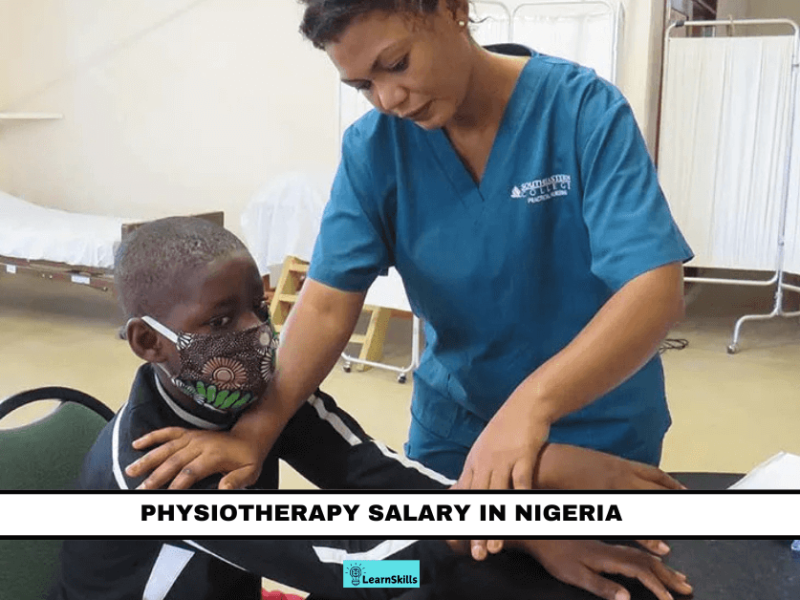As you explore the field of physiotherapy in Nigeria, understanding the salary landscape is essential.
The average monthly salary for a physiotherapist in Nigeria is around NGN 154,250. Some reports indicate it can range from NGN 80,000 for entry-level positions to NGN 180,000 for those with experience.
Data from various sources suggest that salaries can vary based on location, experience, and type of employment.
Overview of Physiotherapy in Nigeria
Physiotherapy plays a crucial role in healthcare in Nigeria. It focuses on helping patients recover from injuries and manage pain through physical methods.
You can expect physiotherapy to include exercises, manual therapy, and education about movement.
As a physiotherapist in Nigeria, you will work in various settings. These include hospitals, rehabilitation centers, and private clinics. Your job may involve treating patients with sports injuries, post-surgery recovery, or chronic pain conditions.
The field is growing, with more awareness about the importance of physiotherapy. There is a demand for skilled professionals.
In Nigeria, medical rehabilitation therapists also fall under the umbrella of physiotherapy. They work alongside physiotherapists to enhance patient care. Together, they aim to improve the quality of life for those facing physical challenges.
If you are considering a career in this field, it’s essential to stay updated on training and certification requirements. Joining professional organizations can also be beneficial for networking and skill development.
Education and Certification Requirements
To become a physiotherapist in Nigeria, you must meet specific educational and certification standards.
Accredited Physiotherapy Programs
In Nigeria, you must complete a 5-year Bachelor of Physiotherapy program to become a qualified physiotherapist. Only seven universities offer accredited training in this field.
These programs cover various subjects, including anatomy, physiology, and rehabilitation practices.
Some universities include:
- University of Lagos
- Obafemi Awolowo University
- University of Ibadan
It’s vital to choose an accredited program to ensure you receive the proper education. This is a key step before entering the workforce and provides you with the knowledge to help patients effectively.
Licensing and Registration
After completing your degree, you need to obtain a license to practice physiotherapy in Nigeria. This requires passing a professional examination conducted by the Physiotherapy Registration Board of Nigeria (PRBN).
You will need to submit your application along with your academic transcripts. Once you pass the exam, you must register with the PRBN to be a licensed physiotherapist.
This registration ensures that you meet national standards and are qualified to provide care. Keeping your license up to date may also involve continuing education to stay current in the field.
Average Salary for Physiotherapists in Nigeria
Physiotherapy salaries in Nigeria can vary widely due to factors like sector and location. Understanding the distinctions between public and private sectors, as well as regional differences, helps you see the full picture of earning potential.
Public Sector Salaries
In the public sector, a physiotherapist’s salary typically ranges from ₦140,000 to ₦160,000 per month. Government hospitals and clinics usually offer stable jobs with fixed pay scales.
New graduates may start at the lower end of this range, while experienced professionals can earn closer to the higher end.
Many public sector physiotherapists also benefit from health insurance as part of their employment package. These roles may come with additional benefits such as paid leave and retirement plans, adding to job security.
Private Sector Salaries
In the private sector, salaries for physiotherapists can vary significantly. You might find monthly earnings between ₦150,000 and ₦200,000, but some top clinics pay more for specialized skills or experience.
Private practice physiotherapists often have the potential to earn bonuses or commission based on the number of patients seen.
Benefits, like health insurance, may not always be guaranteed, so it’s important to consider the entire compensation package when evaluating job offers in this sector.
Regional Salary Variations
Salaries also differ based on geographical location. In cities like Lagos and Abuja, physiotherapists generally earn more due to higher living costs. Salaries in these urban areas can reach up to ₦250,000 per month.
In contrast, smaller towns may see average monthly salaries around ₦120,000 to ₦140,000. When job searching, consider both the salary and the cost of living in each region, as this will greatly affect your quality of life and purchasing power.
Comparative Analysis with Other Countries
When comparing physiotherapy salaries in Nigeria to those in countries like the United States, Canada, and Australia, distinct differences emerge.
Physiotherapy Salary in the United States
In the United States, a physiotherapist’s average annual salary is approximately $85,000 to $95,000. Factors influencing this range include location, experience, and specialization.
In some states, like California and New York, salaries can exceed $100,000 due to the high cost of living and demand for healthcare professionals. Benefits such as health insurance, retirement plans, and continuing education support are common.
Physiotherapy Salary in Canada
In Canada, physiotherapists earn between CAD 70,000 and CAD 85,000 annually. Provinces such as Alberta and British Columbia tend to offer higher salaries due to increased demand for services.
Additional benefits, including paid vacations and professional development opportunities, are also part of the compensation package.
Physiotherapy Salary in Australia
The average salary for a physiotherapist in Australia ranges from AUD 65,000 to AUD 80,000 per year. Cities like Sydney and Melbourne often pay on the higher end of this scale.
Experience and area of practice, such as sports or community health, can affect earnings. You may also benefit from flexible work hours and various workplace incentives, making it a desirable profession in Australia.
Job Market Trends for Physiotherapists
The job market for physiotherapists in Nigeria shows positive trends, driven by increased demand in healthcare settings and growing opportunities in private practice.
Demand in Healthcare Facilities
Physiotherapy services are becoming essential in various healthcare facilities. Hospitals, clinics, and rehabilitation centers are hiring more physiotherapists to support patient recovery.
In 2025, the average salary for physiotherapists in Nigeria is around ₦1,733,288 annually. This salary can vary based on location, experience, and type of facility employed.
Many healthcare facilities prefer candidates with a Bachelor’s or Master’s degree in Physiotherapy. They also look for registered Medical Rehabilitation Therapists. Job openings are increasing, and applications usually close within a few weeks of posting.
Private Practice Prospects
Private practice is another growing area for physiotherapists in Nigeria. Many professionals are setting up their clinics to offer specialized services.
This path can lead to higher earnings compared to working in healthcare facilities. Monthly incomes for physiotherapists in private practice can reach around ₦150,000 and more, depending on client volume and services offered.
Marketing and networking skills are important for success. Building strong relationships with healthcare providers can lead to referrals and a steady client base.
Career Advancement Opportunities
In physiotherapy, there are several paths you can take to advance your career. Focusing on continuing education and exploring specialized areas can help you improve your skills and increase your earning potential.
Continuing Education
Continuing education is essential for you as a physiotherapist. It allows you to stay updated with the latest practices and techniques in the field.
Many organizations and universities offer short courses and workshops. These programs can enhance your knowledge in areas like pediatric or geriatric physiotherapy.
Also, pursuing a Master’s degree can position you for leadership roles. It may open opportunities in teaching or research. Additionally, some employers may offer support for further education, which can be a great advantage.
Specialization Areas
Specializing in a particular area of physiotherapy can set you apart from other professionals. There are various fields to consider, such as:
- Sports Physiotherapy: Focuses on athletes and sports injuries.
- Orthopedic Physiotherapy: Deals with patients recovering from surgery or injuries related to bones and muscles.
- Neurological Physiotherapy: Works with patients who have neurological disorders, like stroke or multiple sclerosis.
Becoming certified in a specialization can help you demand higher salaries. Many health insurance companies also recognize specialists more readily. This ensures better patient access and potential referrals.










